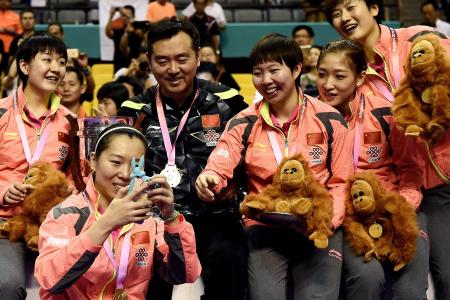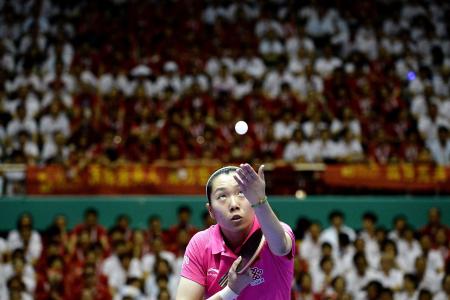Outclassed Japan need 'mental training, skills and strategy' to beat China
REPORTING FROM SHAH ALAM
A packed stadium full of noisy support can be a crucial factor in the success of an athlete or a team - it can lift spirits and intimidate the opposition.
For China's reigning Olympic women's singles champion Li Xiaoxia, it hardly matters if there are huge roars in her favour, or a hostile arena baying for her blood.
Following China's routine 3-0 win over Japan in the World Team Table Tennis Championships final yesterday at the Malawati Stadium, the former world No. 1 (left) said: "We played in Tokyo in 2014 and won rather comfortably there, and it's because we have a strong team, with a strong supporting structure behind it."
VOCIFEROUS SUPPORT
About 5,000 red and white-clad supporters were bussed to the 13,000-capacity stadium yesterday by title sponsor Perfect to support the Chinese team.
The fans were so vociferous that the stadium announcer had to remind them on several occasions to be quiet when a point was in play.
The statistics before the tie were damning - Japan's trio of Ai Fukuhara, Kasumi Ishikawa and Mima Ito had won a combined total of two of 35 previous individual meetings with China's Li, current world No. 1 Liu Shiwen and world No. 2 Ding Ning.
A whitewash looked inevitable when world No. 4 and team leader Fukuhara lost 11-5, 11-6, 11-8 to Liu in the first singles.
But Ishikawa, ranked fifth in the world, was on the verge of drawing Japan level in the second singles against Li, after winning the first two games.
However, she lost her composure and the match 3-2 (6-11, 7-11, 11-9, 11-3, 11-5).
Mima, 15, took the first game against Ding Ning in the third singles 11-8, but also lost her composure to lose the next three games 11-7, 11-8, 11-1, as the Chinese women's team lifted the Corbillon Cup for the 20th time.
With the Singapore team - the only side to beat China in a major competition when they won the 2010 world championships - still in the process of an overhaul, Japan are seen as the team mostly likely to challenge China's dominance in the sport.
But, without divulging too much, the Japanese players and coach Yasukasu Murakami said they had a lot to work on ahead of the Rio Olympics in August.
To knowing smiles from the Japanese paddlers, Murakami said: "We will continue to train hard in the best tactics and strategies to beat China in the future."
When this reporter asked if mental strength is a major weakness, the coach responded: "Of course it is important; there are three factors to success - mental training, skills and strategy. We have to work hard on all of those."
Meanwhile, China's women's coach Kong Linghui refuted a suggestion that their dominance in table tennis was making the sport boring.
He said: "We may have won 3-0 today, but the tie was very exciting. We didn't face any major challenges up till the semi-finals... But I hope the other teams raise their levels for the Olympics.
"This Japanese team are the best I've seen in 10 years, similar to the Singapore team in 2010.
"Mima Ito has the potential to be better than Ai Fukuhara, and will become our main threat in the next 10 years."
Last night, the Chinese men's team also won their 20th world team title with a 3-0 victory over Japan.
Get The New Paper on your phone with the free TNP app. Download from the Apple App Store or Google Play Store now



